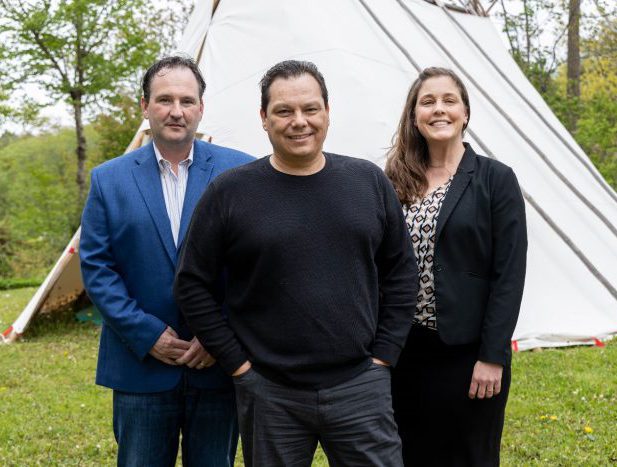Federal government contributing almost $2 million to Kinu Tourism Program
A new Indigenous cohort tourism education program is being established at Mount Saint Vincent University with support from the Federal government.
The Kinu Tourism Program is being developed by Indigenous community leaders and representatives from MSVU’s Tourism and Hospitality Management Program with a goal of removing barriers to post-secondary education while creating opportunity for future Indigenous tourism entrepreneurs. Kinu means inclusive of/us/everyone.
The first of its kind in the country, the new degree program will emphasize Two-Eyed Seeing (Etuaptmunk), a concept introduced by Mi’kmaw Elder Albert Marshall which he describes this way: “To see from one eye with the strengths of Indigenous ways of knowing, and to see from the other eye with the strengths of Western ways of knowing, and to use both of these eyes together.”

[From left to right, pictured in front of the wikuom on the MSVU campus: Dr. Peter Mombourquette, Interim Chair, Business and Tourism Department at MSVU; Robert Bernard, Executive Director, Nova Scotia Indigenous Tourism Enterprise Network; Jennifer Guy, Assistant Professor in the Tourism and Hospitality Management Program at MSVU]
“As the original inhabitants of these lands, our Mi’kmaw ancestors were the first to welcome travelers and settlers to what is now Nova Scotia and Canada. Today, through key investments by governments and strong partnerships with industry and educational institutions like MSVU, we are working to build Mi’kmaw tourism opportunities that will welcome the world to Mi’kma’ki while working with the mainstream tourism industry to find ways to address reconciliation with our Mi’kmaw people,” said Robert Bernard, Executive Director, Nova Scotia Indigenous Tourism Enterprise Network.
Continued Robert, “Students in MSVU’s new Kinu Tourism Program will learn the true history of our province and country through the two-eyed seeing model. They will become stronger and more inclusive leaders in the industry. Through cross cultural awareness opportunities, they will better understand why Indigenous tourism must play a pivotal role in the future of tourism in Canada.”
“A recent report noted that Indigenous tourism sector growth is outpacing Canadian tourism activity overall. However, training was cited as one of the primary barriers to growth. We need to build capacity within post-secondary education to further the development of Indigenous-led tourism experiences,” said Dr. Peter Mombourquette, Interim Chair, Business & Tourism Department, MSVU. “We are deeply grateful for the leadership of the Indigenous community partners who’ve been guiding us in the development of this new program. It is our collective aim that this initiative help build a diverse tourism workforce in our region and beyond, and promote Indigenous world views broadly.”
This project is funded by a grant of $1,964,250 from the Government of Canada’s Sectoral Initiatives Program.*
“As Canada continues to see one of the strongest economic recoveries in the world, we’ll continue to ensure that the sectors hardest hit by COVID-19, like tourism and hospitality, have the support they need to bounce back and grow,” said Carla Qualtrough, Minister of Employment, Workforce Development and Disability Inclusion. “Projects like the Kinu Tourism Program will boost Halifax’s competitiveness in the tourism market and help Indigenous entrepreneurs seize opportunities that the post-pandemic world is creating.”
With the program framework now in place, the process is underway to hire a Mi’kmaw/Indigenous program manager who will lead further consultation with Indigenous communities and tourism industry representatives across the Atlantic region. A Mi’kmaw/Indigenous Program Coordinator and Education Consultant will also be added to the team. The first students in the program are expected to begin their studies in September of 2024.
Partners to date have included:
- Robert Bernard, Executive Director, Nova Scotia Indigenous Tourism Enterprise Network
- Catherine Martin, Member of the L’nu Advisory Circle at MSVU, former Nancy’s Chair at MSVU, and current Director of Indigenous Community Engagement at Dalhousie University
- Shannon Monk, Cultural Tourism Project Manager, Kwilmu’kw Maw-klusuaqn Negotiation Office
- Ann Sylliboy, Member of the L’nu Advisory Circle at MSVU, and Post Secondary Consultant, Mi’kmaw Kina’matnewey
- Sheila Isaac, Member of the L’nu Advisory Circle at MSVU, and Director of Mi’kmaq and Indigenous Post-Secondary Recruitment and Retention, Advanced Education
- MSVU representatives: Patrick Small Legs-Nagge (Special Advisor on Indigenous Affairs); Dr. Peter Mombourquette (co-lead), Jennifer Guy (co-lead), Dr. Nicholous Deal, Paulette Cormier-MacBurnie, Dr. Shuyue Huang, and Minakshi Gonzalez Cerdeira (all of the Business and Tourism Department), Scott Daniels (Co-operative Education Manager), and Dr. Amy Thurlow (Communication Studies).
MSVU is located on unceded ancestral Mi’kmaq territory. This territory is covered by the Covenant Chain of Treaties of Peace and Friendship signed between 1725 and 1779. We pay respect to the knowledge embedded in the Indigenous custodians of this land and to the Elders, past, present, and future.
-30-
About Mount Saint Vincent University
As a leader in online and experiential learning, and based on a strong tradition of social responsibility, Mount Saint Vincent University takes a personalized approach to education to nurture socially responsible global citizens. Founded in 1873, the Mount has been nationally recognized for having one of the lowest student-to-professor ratios, for providing students early access to valuable research opportunities, for its legacy in the advancement of women, and for facilitating critical advancements in food security, healthy aging, literacy, and childhood development. MSVU is located in Mi’kma’ki, the unceded and ancestral territory of the Mi’kmaq People.
Media contact:
Gillian Batten
Director, Communications
Mount Saint Vincent University
(902) 457-6439
Gillian.Batten@msvu.ca
* The opinions and interpretations in this publication are those of the author and do not necessarily reflect those of the Government of Canada.